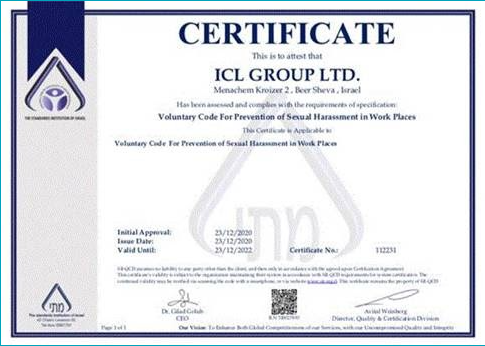Next Topic
Select SDGs to find out how we are taking action in support of the UN Substinable Development Goals
2022 ISRAEL CHEMICALS LTD. | ALL RIGHTS RESERVED

| 2018 | 2019 | 2020 | |
|---|---|---|---|
| Israel | 4,431 | 4,507 | 4,401 |
| China | 2,068 | 2,064 | 2,048 |
| Spain | 901 | 892 | 868 |
| USA | 707 | 720 | 716 |
| Germany | 856 | 858 | 697 |
| UK | 644 | 658 | 670 |
| Netherlands | 539 | 584 | 584 |
| Brazil | 255 | 262 | 259 |
| France | 118 | 119 | 117 |
| All other | 523 | 426 | 472 |
| Sub Total | 11,042 | 11,090 | 10,832 |
| Temporary employees | 1,083 | 1,027 | 912 |
| Total employees | 12,125 | 12,117 | 11,744 |
*Employee numbers in the table include some long-term contract workers and student employees.
As of December 31, 2020, the Company’s workforce (including some long-term contract workers and student employees) was comprised of 11,744 employees.
ICL strives to be a fair and responsible employer in all regions of its global operations. The Company pays competitive wages or higher at all of its sites worldwide. Although employment terms vary, ICL’s goal is to be a fair and desirable employer in all areas of its operations. Being an “Employer of Choice” is a top priority for ICL. To do so, the Company spends significant resources on structured plans, from training and development to employee welfare and wellbeing.
ICL’s effort is paying off, and the Company’s ranking as an ‘Employer of Choice’ continues to rise.
ICL’s mission is to retain and hire the best talent. Therefore, ICL is engaged in multiple endeavors to increase its pool of potential applicants, including by actively searching to increase the diversity of its workforce.
The percentage of women serving as officers in ICL’s executive global management increased from 11% in 2017 to 27% in 2020.
ICL observes all applicable labor and employment laws wherever it operates, including laws that pertain to freedom of association, privacy, collective bargaining, employment discrimination, forced labor, compulsory labor and child labor. ICL also prohibits all forms of illegal discrimination. The Company’s employees are employed according to employment terms prevalent in the countries in which they are employed.
ICL is expanding its use of management performance infrastructure (the Success Factors system) to manage ICL’s human resources. In this context, the Company is also assimilating globally unified work processes.
The SF (Success Factors) system enables managers and employees to participate in a performance management process based on goals and performance evaluation, as well as team and individual development plans. The system also includes learning and training processes. Implementation of the global processes is expected to expand and will include additional processes in the areas of compensation and communications.
Approximately 40% of ICL’s global workforce participated in these performance management processes, synchronizing between performance and compensation.
Approximately 68% of ICL’s employees are included in collective bargaining agreements.
There is no risk of forced labor. There are no identified operations or suppliers that are exposed to violations of the right to exercise freedom of association nor collective bargaining agreements that are violated. ICL does not employ those who are under the age of 17, and no employees at production sites are under the age of 21. The exception to this is apprenticeship programs (operated in some of ICL’s global operations) in which some participating students can be as young as 16 (with limited and safely monitored roles). All apprenticeship programs are regulated (and encouraged) by local authorities and adhere to prospective work regulations (read more here).
The majority of ICL employees, approximately 68%, are employed under collective labor agreements, mainly in Israel, China, Germany, the U.K., Spain and the Netherlands. There is very limited seasonal employment. Senior employees in special positions and members of management are usually employed under personal agreements. These agreements are for an indefinite period but can be terminated upon proper notice.
ICL is implementing a Labor Law Enforcement Plan in Israel. The objective of the plan is to ensure that all ICL operating activities are performed in compliance with labor laws. ICL will achieve this through employee training and refresher courses, audits by labor attorneys, and documentation of all labor practices. The first stages of the plan have been implemented. All potential gaps between labor legislation in areas where ICL has a significant volume of activity and ICL’s operations on the ground have been mapped. No significant gaps were found, and a plan was designed to close the small gaps that were identified.
The data breakdown of employees used in the following three tables represents 100% of ICL’s total number of Company employees at the end of 2020 (not including students and contract employees).
| 2020 | Male | Female | All |
|---|---|---|---|
| All Employment Types | 9,110 | 2,090 | 11,200 |
| Permanent | 8,843 | 2,025 | 10,868 |
| Temporary | 267 | 65 | 332 |
*Employee numbers in the table exclude long-term contract workers and student employees
| 2020 | Permanent | Temporary | All Employment Types |
|---|---|---|---|
| Israel | 4,397 | 240 | 4,637 |
| Americas | 1,028 | 5 | 1,033 |
| Europe | 3,257 | 70 | 3,327 |
| APAC | 2,186 | 17 | 2,203 |
*Employee numbers in the table exclude long-term contract workers and student employees
| 2020 | Male | Female | All |
|---|---|---|---|
| All Employment Types | 9,110 | 2,090 | 11,200 |
| Full Time | 9,077 | 1,980 | 11,057 |
| Part Time | 33 | 110 | 143 |
*Employee numbers in the table exclude long-term contract workers and student employees
Following are ICL global employee turnover figures and rates for 2020.
Overall ICL employee turnover rate in 2020 was 9%.
| 2020 | Israel | Americas | Europe | APAC |
|---|---|---|---|---|
| # of Employees Leaving ICL | 623 | 110 | 282 | 23 |
| % Male | 80% | 75% | 76% | 65% |
| % Female | 20% | 25% | 24% | 35% |
| # of New Hires Entering ICL | 492 | 113 | 366 | 25 |
| % Male | 79% | 68% | 73% | 72% |
| % Female | 21% | 32% | 27% | 28% |
ICL has zero tolerance for harassment of any kind or discrimination of any form in the workplace. ICL prohibits harassment based on race, color, religion, gender, sexual orientation (i.e. LGBTQ), national origin, age, disability, veteran status, or any other legally protected characteristic of an individual. ICL strictly complies with the anti-harassment laws of all countries and territories in which it operates.
Managers and supervisors are required to take an active and leading role in the prevention of harassment and retaliation.
Proactive measures:
ICL will not retaliate against any employee who reports a concern in good faith, regardless of the outcome of the investigation.
ICL successfully adopted a voluntary code for anti-sexual harassment in the workplace formulated by the Standards Institution of Israel (MATI). This code establishes a standard higher than regional regulations against sexual harassment in Israel. ICL is the first industrial company in Israel to implement the voluntary code for employers against sexual harassment in the workplace.
During 2020, ICL sites in Israel were physically examined and reviewed by MATI examiners as part of a comprehensive certification process that evaluates ICL’s compliance with the voluntary code.
The certification process included interviews with employees, inspections of sexual harassment prevention supervisors and HR managers at the various sites, an examination of the training and compliance system on the subject and an in-depth examination of ICL's prevention and treatment mechanisms for sexual harassment complaints.
Thanks to the cooperation of ICL’s Compliance Department, HR Department, site QA managers and, above all, the Anti-Sexual Harassment supervisors, the Company completed the certification process successfully.
The code is an operative tool for creating a clear and orderly process for preventing and treating sexual harassment. It is effective in coping with the phenomenon. It strengthens employees' personal sense of security and it enables ICL to act on its values and responsibility in order to create a respectful and safe work environment with zero tolerance for sexual harassment.


